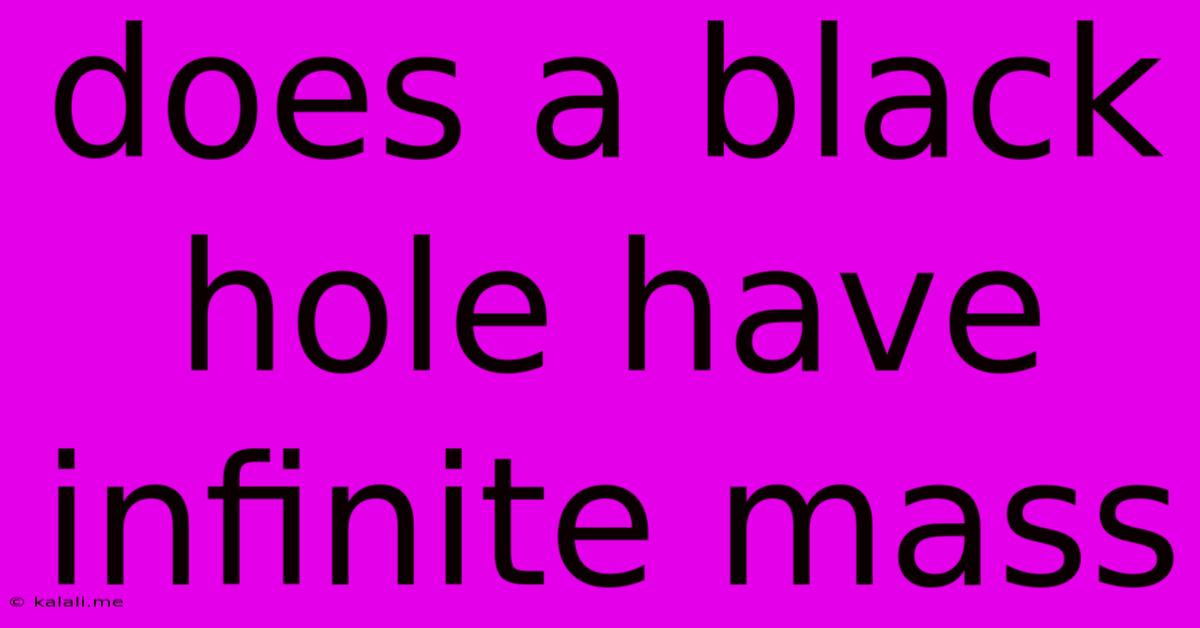Does A Black Hole Have Infinite Mass
Kalali
Jun 10, 2025 · 3 min read

Table of Contents
Does a Black Hole Have Infinite Mass? Unraveling the Mystery
Meta Description: Black holes are incredibly dense objects, but do they possess infinite mass? This article explores the concept of black hole mass, singularity, and the limits of our understanding of these cosmic enigmas.
The question of whether a black hole has infinite mass is a common misconception stemming from its seemingly boundless gravitational pull. The truth, however, is far more nuanced and fascinating. Black holes don't possess infinite mass; rather, they possess a finite, albeit incredibly large, mass. This mass is determined by the amount of matter that collapsed to form the black hole in the first place. The immense gravitational force isn't a result of infinite mass, but rather the extreme compression of that matter into an incredibly small space.
Understanding Black Hole Formation and Mass
Black holes form when massive stars reach the end of their life cycle. After exhausting their nuclear fuel, these stars collapse under their own gravity. This collapse is so powerful that it overcomes all other forces, crushing the star's matter into an incredibly dense point known as a singularity. This singularity is not a region of infinite density, despite popular imagination. The current understanding of physics breaks down at the singularity.
The mass of a black hole is directly related to the mass of the star that preceded it. A more massive star will result in a more massive black hole. This mass isn't magically created; it's simply the conserved mass of the original star, concentrated within a dramatically smaller volume. The gravitational effects we observe are a consequence of this extreme density, not infinite mass.
The Concept of Singularity and Density
The singularity at the center of a black hole is a point of infinite density, according to classical general relativity. However, this concept is problematic. It represents a breakdown in our current understanding of physics. We need a theory of quantum gravity to accurately describe what happens at the singularity. Current theories suggest that the density might be incredibly high, but not truly infinite.
It’s crucial to differentiate between density and mass. While the density at the singularity is theoretically infinite (according to classical general relativity), the mass of the black hole itself remains finite. Think of it like squeezing a balloon—you're increasing the density, but the total amount of air (mass) remains the same.
Observing Black Hole Mass
Astronomers can indirectly measure the mass of black holes by observing their effects on surrounding matter. For example, by observing the orbital velocities of stars orbiting a black hole, scientists can calculate the black hole's mass using Kepler's laws and Newtonian mechanics. The effects on the light and matter around them, like gravitational lensing and accretion disk dynamics, also provides vital information about their mass.
The Event Horizon and its Significance
The event horizon is not a physical boundary but rather a point of no return. Anything that crosses the event horizon is inevitably pulled into the singularity. The size of the event horizon is determined by the black hole's mass, as described by the Schwarzschild radius. However, this radius and the event horizon don't imply infinite mass within the black hole.
In Conclusion: Finite Mass, Immense Gravity
In summary, a black hole does not possess infinite mass. It possesses a finite mass, determined by the mass of the progenitor star. The immense gravity associated with black holes is due to the extreme compression of this mass into an incredibly small volume. The singularity, a region of theoretically infinite density, represents a limitation of our current physical theories, not a confirmation of infinite mass within the black hole itself. Further research and a complete theory of quantum gravity are needed to fully understand the nature of singularities and the ultimate fate of matter within a black hole.
Latest Posts
Latest Posts
-
Radius Of Convergence Calculator With Steps
Jun 12, 2025
-
Moment Of Inertia Of A Cube
Jun 12, 2025
-
How Many Zeros Are In 1 Crore
Jun 12, 2025
-
Which Of The Following Is Not True About Ram
Jun 12, 2025
-
What Does Having A 140 Iq Mean
Jun 12, 2025
Related Post
Thank you for visiting our website which covers about Does A Black Hole Have Infinite Mass . We hope the information provided has been useful to you. Feel free to contact us if you have any questions or need further assistance. See you next time and don't miss to bookmark.